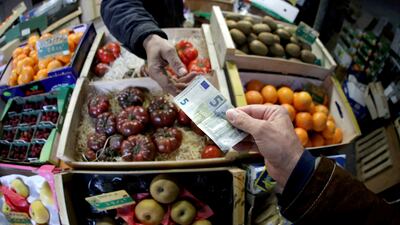Eurozone inflation surged to 7.5 per cent in March, hitting another record high with months still left before it is set to peak.
Consumer price growth in the bloc accelerated from 5.9 per cent in February, Eurostat said on Friday, far beyond previous expectations of 6.6 per cent, as war in Ukraine and sanctions on Russia pushed fuel and natural gas prices to record highs.
Although energy was the chief culprit, inflation in food prices, services and durable goods all came in above the European Central Bank's 2 per cent target, further proof that price growth is increasingly broad and not merely a reflection of expensive oil.
With the ECB having persistently underestimated inflation over the past year, the figure will come as a shock to policymakers, some of whom are already calling for tighter policy to avoid high price growth becoming entrenched.
The inflation data speaks for itself, said Joachim Nagel, president of the German Bundesbank, on Friday. “Monetary policy should not pass up the opportunity for timely countermeasures.”
The central bank governors of Austria and the Netherlands have already called for rate increases this year, worried that rapid price growth is becoming broad-based, an argument supported by underlying data from Friday's release.

Inflation excluding volatile food and fuel prices, closely watched by the ECB, picked up to 3.2 per cent, from 2.9 per cent, while a narrower measure that also excludes alcohol and tobacco products jumped to 3 per cent, from 2.7 per cent.
Any cut in Russian gas supplies would also quickly feed through to customers, boosting prices even as governments are putting in place subsidy measures to offset some of the cost.
All this leaves the ECB with a difficult policy dilemma. Its main task is to limit inflation to 2 per cent but tightening policy now would risk crashing an economy that is already reeling from the fallout of the war in its neighbour and the lingering impact of the Covid-19 pandemic.
The ECB estimates that growth in the first quarter was positive, but barely, while second-quarter growth will be near zero as high energy prices dent consumption and hurt corporate investment.
That would suggest the bloc is near a state of stagflation, where rapid inflation is coupled with stagnating growth.
High energy prices are traditionally a drag on growth and will actually weigh on inflation once the immediate increase passes, raising the risk that price growth will later fall back below target.
But the ECB can hardly ignore high inflation, especially since it says the peak is still three to four months away.
The eurozone's labour market is at the tightest it has been in decades, so wage inflation, a precondition of durable consumer inflation, is already in the pipeline. And ECB inaction would also boost inflation expectations, something expected to make price growth more permanent.
“Looking ahead, all of the latest survey evidence suggests that price pressures remain extremely strong, so there is a good chance that core inflation will keep rising,” Jack Allen-Reynolds at Capital Economics said.
“We think that the ECB will soon conclude that it can't wait any longer before starting to raise interest rates.”
The ECB has underestimated price growth throughout the past year, so its credibility is on the line.
The expected compromise will be for the bank to tighten monetary policy this year, but by the smallest increments.
Markets are now pricing in 60 basis points of rate increases by the end of the year but policymakers have been more cautious, with not a single one calling for moves so large.
However, the risk is that big inflation surprises could force the ECB to tighten more quickly and play catch-up later on.


